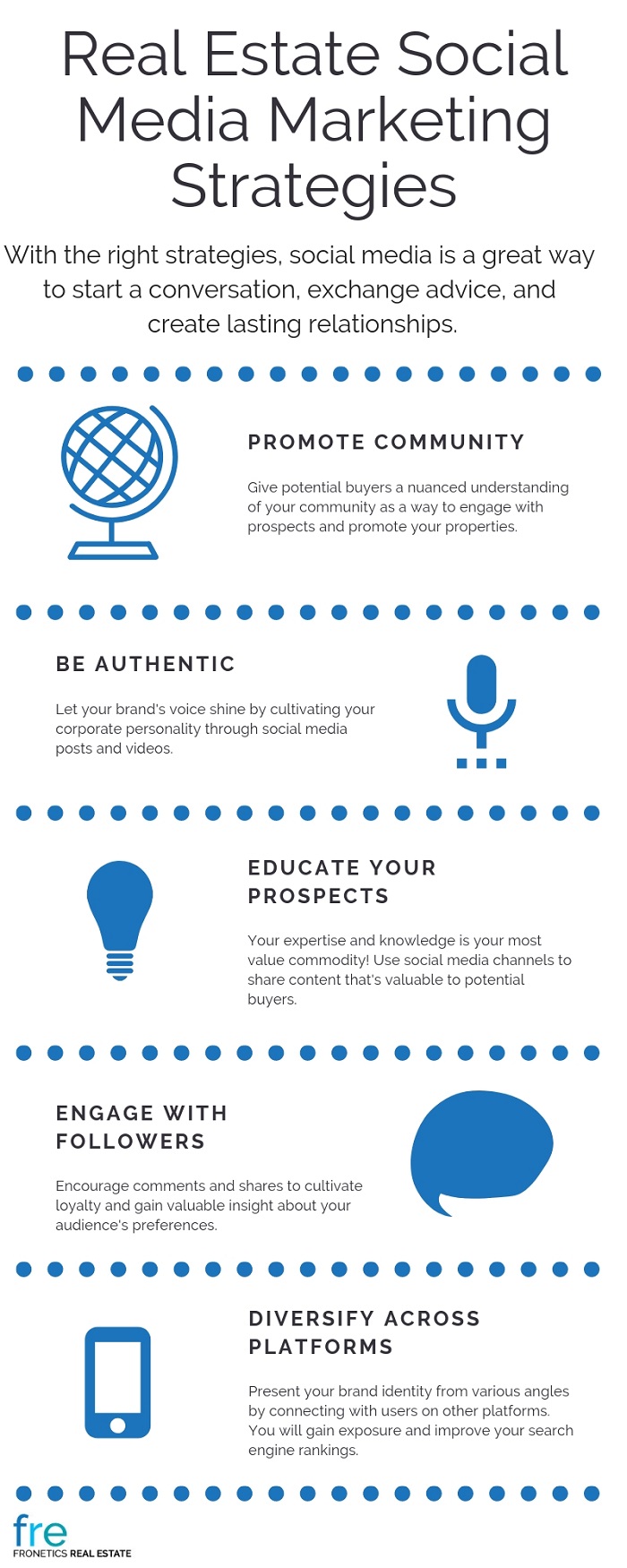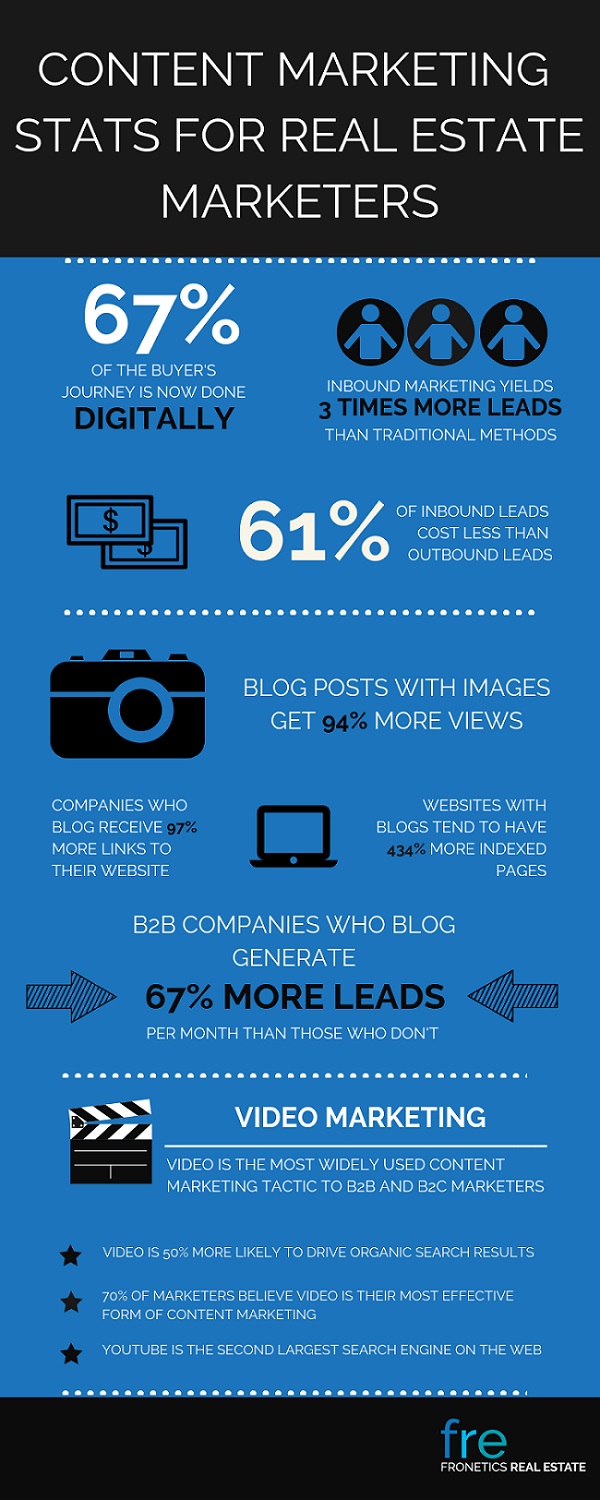Archive for the "Content Marketing" Category

How to Nurture Real Estate Leads with Content Marketing
Done right, content marketing is the most effective way out there to generate real estate leads—and to nurture them to fruition. Here’s how to make the most of this strategic resource.
If you generate a huge amount of leads, that means you’ll get an influx of new clients, right? Not so fast. Having an effective lead generation campaign is great, but it’s only half the battle. To produce actual business, you need a strategy in place to nurture real estate leads once you’ve attracted them.
An effective lead generation campaign means having a documented strategy, an effective website with strong SEO, good calls-to-action, and a robust social media presence. All of these things can be best accomplished with content marketing — and it’s your best friend when it comes to nurturing and converting those leads you’ve generated.
Nurture real estate leads with content marketing: a crash course
Before we get too far, let’s slow down and define what it means to nurture real estate leads with content marketing in the first place. In fact, real estate marketers are often so focused on generating leads, that this crucial part of the process gets overlooked.
At its most basic level, when we talk about nurturing a lead, we’re talking about continuing a conversation. When you generated the lead, you attracted the attention of a prospect, and planted the seeds of an ongoing relationship. But in order to germinate, these seeds need to be cared for — and that’s what lead nurturing is all about. You continue to stay in a conversation with your prospect from the first contact until they are ready to become a client.
Putting your content to work
“Lead nurturing campaigns focus on creating mutually-beneficial working relationships so that when it comes time to buy, that lead turns to you, or your business, instead of a competitor,” writes real estate marketing expert Vinny La Barbera. When it comes to staying at the forefront of a prospect’s mind, and successfully nurturing a real estate lead to conversion, there’s no better tool at your disposal than content marketing.
Social media is a perfect place to use content to nurture real estate leads. Connecting with your prospects, answering their questions, and sharing relevant, helpful content (particularly video!) is key to staying on your prospects’ radar.
Another effective way to use content marketing to nurture leads is with a blog. While some of your posts should be geared to generating leads, others should be written with a focus on cultivating existing relationships, and helping prospects decide to take the next steps. For real estate marketers, this means you can write about topics like the location of your properties, available features and amenities, and information about neighborhoods and communities.
Of course, email content is crucial to an effective lead nurturing strategy. The first step is to segment your email list, so that you’re creating targeted messaging for those at different stages of the buyer’s journey. Your emails should always include a call-to-action, to give prospects the opportunity to engage further with your brand and properties.
The bottom line
With any of your content marketing efforts, including nurturing real estate leads, the most important thing to keep in mind is that you are offering value to your prospects. By sharing your knowledge and expertise through your content, you’re answering the needs of your prospects and building their trust in your brand and properties.
Related posts:
- 5 Luxury Real Estate Brands that Use Content Marketing to Sell Property
- Video: How Content Marketing for Real Estate Can Help Sell Properties
- 4 Ways a Blog Can Help You Sell Real Estate
Archive for the "Content Marketing" Category

Infographic: Real Estate Social Media Marketing Strategies
Social media for real estate marketing is one of the most powerful tools out there. Our infographic will help you figure out the best social media marketing strategies—and the mistakes to avoid.
We’ve said it before, and we’ll say it again: real estate marketing and social media are a match made in heaven — when used correctly. With the right strategies, using social media for real estate marketing is a great way to start a conversation, exchange advice, and create a lasting relationship with prospects.
We can’t stress enough that to be effective, social media needs to be done right. Bubba Mills, chief executive officer of Corcoran Consulting & Coaching advises, “done right, social media can increase your trips to the bank. Done poorly, it can drive you to the poor house.” Take a look at our infographic with social media do’s and don’ts for real estate marketers.
What you should be doing: social media marketing strategies
Promote the community, not just your properties
Renters, buyers, and investors are looking for more than just a property — they want to know something about the place they’re considering living or investing in. Too many real estate blogs just skim the surface of what communities have to offer. Making use of social media platforms to give potential buyers a nuanced understanding of your community is a great way to engage with prospects and promote your properties.
Be authentic
Social media for real estate marketing is all about the personal. Users on these platforms are looking to connect with the real people behind the brands they follow. Part of building your brand is about discovering and cultivating your “corporate personality,” particularly when it comes to social media. Find your brand’s voice, and let it shine through.
Educate your prospects
You may not expect it, but social media users actually like educational content. According to the 2018 Sprout Social Index, 59% of customers express greater trust for “posts that teach” on social media. Educating your audience is also at the core of content marketing — at the end of the day, your knowledge and expertise is your most valuable commodity — even more so than your properties. Use your social media for real estate marketing to share content that’s valuable to potential buyers and renters, whether it’s buying guides, case studies, or local statistics.
Engage with your followers
It may seem painful obvious, but too many real estate marketers forget that social media is just that: social. When followers engage with your posts, always reply! Encourage comments and shares, and join the conversation. Not only is it a great way to cultivate a loyal following, but you can also gain valuable insights into your audience’s preferences.
Diversify across platforms
While Facebook still reigns supreme in the social media universe, if you aren’t connecting with users on other platforms, you’re missing out on huge opportunities. While each platform requires its own content and posting strategy, you’re essentially presenting your brand identity from the various angles allowed by different platforms. Not only that, using multiple social media platforms helps improve your search engine rankings.
Steer clear of these practices
Overzealous advertising
Nobody likes pushy sales language, especially on social media. Steer clear of posts that do nothing but overtly promote your properties. Instead, focus on educating your audience, and answering their questions.
Forgetting the visual
Social media is all about the visual, especially video. Be sure to include relevant images with posts and use video whenever possible.
Assuming that just because you’re online, offline rules don’t apply
It may seem obvious, but it’s all too often forgotten. This is a good rule, and an easy metric by which to judge any content before posting: Your interactions online should measure up to professional interactions you would have in person.
Reposting without checking
Re-posting content that’s of interest to your audience is a great way to promote discussion and engagement. But don’t get sloppy. Remember that even if content didn’t start with you, if it’s posted on your company’s social media accounts, it represents your brand and properties. Make sure content is well-researched and from reliable sources. Want to re-post something controversial? Just be sure to include a disclaimer or explanation in your post.
Forgetting about emotional intelligence
Never forget that behind every social media account is a human being. The bottom line: bring emotional intelligence to your social media management. Take the time to address any issues with compassion and understanding.
The takeaway
With the right strategies, social media is an extremely effective tool for real estate marketers to promote their brand and properties. But it does require a significant investment of time, resources, and creativity. Start connecting with your audience, and watch your brand grow.
Related posts:
- Social Media Can Be a Strategic Weapon in Real Estate Marketing
- 5 Tips for Building a Successful Real Estate Social Media Marketing Program
- Must-Know Social Media Strategies for Real Estate
Archive for the "Content Marketing" Category

3 Ways to Boost Your Real Estate Marketing with Video
Video marketing is no longer the wave of the future—it’s now. And it’s one of the best and most cost-effective ways to grow your social media audience and generate leads.
If you’re a real estate marketer, you’re probably aware that one of the biggest industry trends in 2018 is the growing prevalence of video. Recent research from Social Media Examiner indicates that not only do nearly two-thirds (63%) of marketers use video content in their social media marketing, but 77% plan to increase video content within the next year.
These days, most real estate searches start online—in fact, according to RESAAS, 67% of the real estate buyer’s journey is now done online. Since video is the most popular and most widely shared form of online content right now, it’s key to creating a positive first impression, and converting leads.
Here are three ways that you can use video to give your real estate marketing efforts a boost.
Show you know the area using real estate marketing with video
Whether your properties are rural, urban, or suburban, displaying deep knowledge of your location and community is crucial to cultivating credibility. You can use real estate marketing with video to demonstrate your local credentials. Jason Hsiao, Chief Video Officer and Co-Founder of Animoto, suggests that “there’s no need to hire a team of videographers or invest in expensive equipment—a simple neighborhood overview or market update can demonstrate your expertise.”
For example, Brothers Commercial Brokerage of New Jersey used Animoto to create a Facebook video detailing the history of a local building, tapping into a sense of nostalgia and pride of place. It received 14,000 views, as well as 129 shares, and helped engage a new segment of potential buyers and renters.
Up your social media game
Professionalism on Facebook and Instagram is all about presentation and finding the right balance of appealing to the personal, while maintaining a streamlined image for your brand. Effective use of video can go a long way to improving your social media presence. Creating videos, like the one Brothers Commercial Brokerage used, is cost-effective and prime fodder for sharing online.
Instagram Stories lets you post videos in small, 15-second increments, and can be an ideal platform for quick video tours of units or properties. Because of Facebook’s recent newsfeed changes, your best bet is to upload videos directly to Facebook’s platform, rather than sharing YouTube or other links.
Establish your credibility and build your brand
We live in a highly visual world, particularly when it comes to social media. Real estate marketing with video is an immediate and effective way to reach your audience and show them what makes your brand and properties special. “On social media, where competition is loud, video helps your brand cut through the noise and stay ahead of the curve,” says Hsiao.
Video is an ideal way to connect with your market, establish your credentials, improve your social media engagement, drive traffic to your website, and generate leads. And best of all, videos don’t require a large financial investment, just some planning and creativity. Fuel your real estate marketing with video, starting today.
Related posts:
- 10 Social Media Statistics for Real Estate Marketers 2018
- 4 Real Estate Marketing Trends 2018
- How Inbound Marketing for Real Estate Works to Improve Sales
Archive for the "Content Marketing" Category

Social Media for Real Estate: 5 Social Media Hacks to Grow Your Business
Social media and real estate are a natural match. These five strategies will help you make the most of this powerful set of marketing tools.
Social media for real estate marketers is a powerhouse. These are free platforms that marketers can use to share their businesses with the public, generating plenty of returning customers in the process. These five social media hacks are a great place to get started growing your real estate marketing business.
1. Find your brand identity using social media for real estate
One of the top frustrations among new social media marketers happens when they try to create a strong following based solely on name recognition. In order for your target audience to be reached and engaged, your brand’s identity needs to be fully fleshed out and presented in your online profiles. Presenting a strong brand identity gives potential buyers the tools to find you, and to decide that you’re the right match for them.
2. Diversify across platforms
While Facebook still reigns supreme in the social media universe, if you aren’t connecting with users on other platforms, you’re missing out on huge opportunities. While each platform requires its own content and posting strategy, you’re essentially presenting your brand identity from the various angles allowed by different platforms. Not only that, using multiple social media platforms helps improve your search engine rankings.
3. Get social—connect with relevant groups
We’ve written before about the value of guest blog posting when it comes to real estate marketing. The same holds true for your social media for real estate strategy. Finding relevant influencers for your brand, and affiliating with them on social media is a great way to reach a broader segment of your target audience. Reach out to influencers to ask them to share your content—it’s a win for both of you.
4. Keep up with the latest
Staying up with what your audience and community on social media is talking about helps ensure that your content is relevant and engaging. Follow hashtags that are relevant for your real estate business, for example, and when you see content that resonates, share it on your own profiles, along with some analysis.
5. Use SEO tools
SEO tools (like Google Trends, Similar Web, and more) aren’t just for websites—they’re an excellent way to boost your reach when you leverage social media for real estate. These tools can help increase your follower counts, as well as your post visibility. In turn, your search rankings will get a boost.
Building your real estate brand can seem like a daunting task, but social media for real estate provides real estate marketers an easy-to-use set of tools. Be strategic about your content and strategies, and watch your business grow and develop.
Related posts:
- Must-Know Social Media Strategies for Real Estate
- 10 Social Media Statistics for Real Estate Marketers 2018
- Social Media Can Be a Strategic Weapon in Real Estate Marketing
Archive for the "Content Marketing" Category

3 Tips for Marketing to Millennial Real Estate Buyers
Home buyers are getting younger. Is your marketing strategy ready to meet the needs of millennial real estate buyers?
Consider this: more than a third of all home buyers came of age in the digital age. That’s right—millennials, those aged 36 and younger, now make up 34% of home buyers, which is the largest chunk of any generation buying homes right now.
These digital natives have a buying process that’s completely foreign to older generations, which means “traditional” marketing tactics won’t cut it when it comes to appealing to this demographic. Adjusting your strategy to resonate with millennials makes sense not just because it helps you reach this segment of the market, but also because it keeps you better positioned for the future of real estate marketing.
These three tips will help you adjust your strategy to market to millennial real estate buyers.
1) Be ready to guide them through the process
Millennials get a lot of bad press, as a generation that requires constant coddling and hand-holding. But to be fair, these young home-buyers are new to purchasing real estate—the vast majority (66%) of buyers ages 36 and under are first time home-buyers.
Buying a home is a complicated process, and millennials are looking for agents who will take the time to help guide them through the process. What does this mean for your marketing strategy? Placester’s Carolyn Berk suggests that “because guidance is so important to millennials, your marketing should emphasize your dedication to assisting customers every step of the way.”
This means offering resources and strategies rather than simply promoting available properties. For example, an eBook that guides first-time home buyers through the process is a great way to demonstrate your knowledge and commitment to supporting your clients through the buyer’s journey.
2) Help millennial real estate buyers save money
More than previous generations, millennials are saddled with student loan debt and often rely on sources other than just savings to finance their down payments. Simply put, they are looking to save at every opportunity.
Once again, content is your best bet for demonstrating to millennial real estate buyers that you are there to help them save money. Blog posts, testimonials, and case studies should detail your expertise in getting your clients the best possible deal. “Small things, like helping with contract negotiations or mortgage lender references, can go a long way with millennial buyers,” says Berk.
3) Go digital
This one probably seems obvious, but you’d be surprised at how many real estate professionals neglect their digital marketing presence. From social media to your website, marketing online is no longer optional, it’s expected. Millennial real estate buyers are heavily using the internet during their search and buying process, and your marketing strategy needs to be ready to meet them online.
First off, your SEO (search engine optimization) is key—your content needs to be readily available to potential buyers entering relevant search queries. “Aligning the content in your website to keywords that millennials use to search for homes in your region will help you pop up in search listings,” suggests Berk.
Your social media presence is also important. Millennials are checking Facebook, Twitter, Instagram, and Snapchat frequently throughout the day, and they should be finding your content. Take advantage of these visual media to promote your properties with photo and video content.
Marketing to millennial real estate buyers makes sense for your overall marketing strategy and helps keep your brand relevant and ready to adapt to the future.
Related posts:
- 5 Tips for Building a Successful Real Estate Social Media Marketing Program
- Real Estate Firm Grows Sales by 300% through Content Marketing
- Must-Know Social Media Strategies for Real Estate
Archive for the "Content Marketing" Category

Infographic: Content Marketing Statistics Every Real Estate Marketer Should Know
It’s a given that if you’re a real estate marketer, content marketing should be a big part of your strategy. These are the content marketing statistics you should know about.
Real estate marketers should definitely be adding inbound marketing (content marketing) to your arsenal if you want to reach occupancy at your property. This doesn’t just mean the occasional blog or social media post. We’re talking a full range of content: video, high-value resources, etc.
We’ve pulled some of what we think are the most interesting content marketing statistics out there right now. Take a look at our infographic at the bottom of this post. We hope it will help spark some ideas for you own successful real estate marketing strategy.
Content marketing statistics — the big takeaways
This shouldn’t come as a surprise: the biggest thing you should be taking away from these statistics is that a well-documented, consistent content marketing strategy absolutely needs to be part of your overall business model.
Consider this: 90% of home buyers look online to find their next home, and 70% of them will be getting a sense for who you are through your online content. And by content, we don’t mean ads. we mean the inbound marketing materials like blog posts, videos, case studies, ebooks, and other content that you produce.
The content you create, curate, and share is the single best brand ambassador you have. Too many real estate marketers take a passive approach to their online reputations, rather than taking control of this goldmine of a resource. Content marketing is about using your expertise and what’s special about your brand to become a resource for your audience, and to generate leads by developing meaningful and lasting relationships with your prospects.
We’ve pulled together this infographic of content marketing statistics to give you a full picture of the value of content marketing when it comes to real estate.
Infographic: content marketing statistics for real estate marketers
Data for the infographic came from REASS. (Made with Canva)
Related posts:





